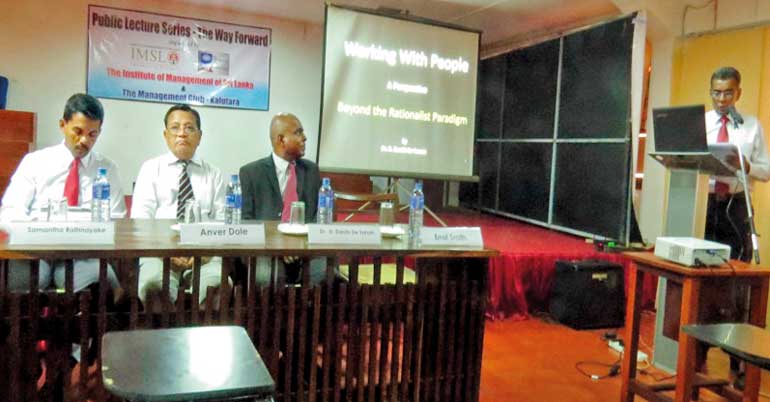Friday Feb 20, 2026
Friday Feb 20, 2026
Monday, 16 May 2016 00:00 - - {{hitsCtrl.values.hits}}

An evening presentation was conducted recently by the Management Club – Kalutara in association with the Institute of Management of Sri Lanka, at the Hector Kobbekaduwa Agrarian Research and Training Institute in Colombo.
Dr. Darshi de Saram – Academic Director at Sawa Training Services in the Sultanate of Oman who is on holiday in Sri Lanka, made an impressive presentation of ‘Working with People: A Perspective Beyond the Rationalist Paradigm’.
Speaking on the limitations of the rationalist paradigm – he emphasised that human beings often do not act rationally as they naturally apply other approaches to deal with complexities of real life. He further articulated that most professionals, trained to think rationally by pursuing disciplines such as natural sciences, find it difficult to work with people. There are other phenomena that need to be considered to successfully work with intelligent beings. By understanding the existence and significance of such phenomena, professionals can learn to look beyond the rationalist perspective that they usually bring to work.
He explained that the most fundamental units that make an organisation are interactions (anything from which a meaning could be inferred). If two persons or parties do not interact, there is no organisation between them. Responses or possible responses to our interactions restrain us from saying/doing what we want; thus creating power relations. Such interactions and relations evolve continuously. Organisations are, hence, pools of evolving interactions and responses. Quality of one’s interactions enables any participant better manage restraining responses to achieve what one desires in that context. Quality of interactions is, thus, the most essential ingredient that enables managing organisational dynamics.
Building trust and alignment he said, is thus a continuous endeavour of making quality interactions, paying attention to other interactions that take place, understanding what is developing in conversations, how the thought processes evolve, who is becoming dominant and who is not, and so on. That is the challenging job of a leader, much easier to perform in a healthy organisation. There are two unhealthy extremes of organisations.
Errol Smith, Vice President of the Management Club as well as Vice President of the Institute of Management of Sri Lanka, in his welcome address gave a brief of the Management Club and the Institute of Management of Sri Lanka.
This interactive program was well attended and the interest and enthusiasm displayed by the participants was very encouraging.